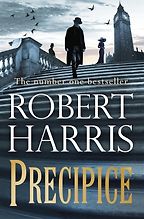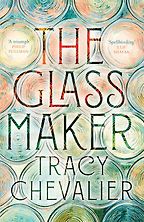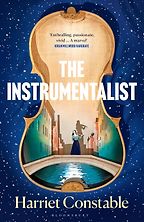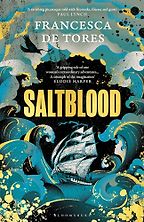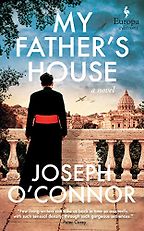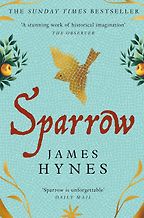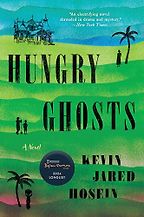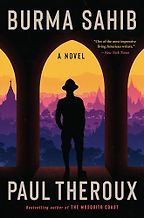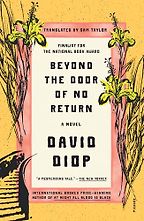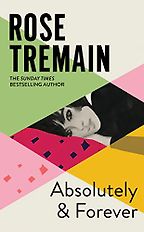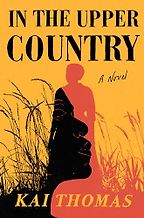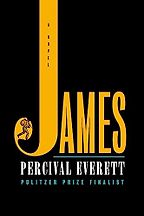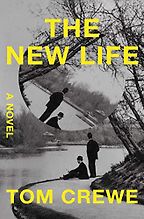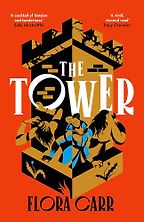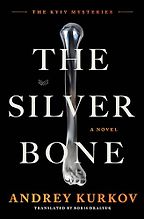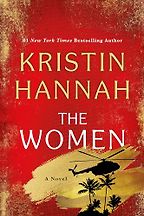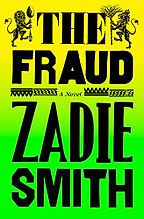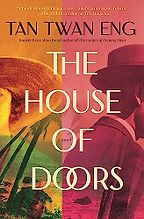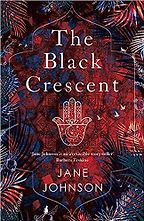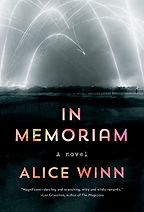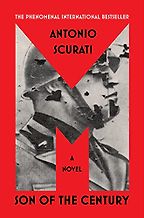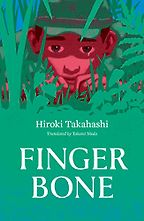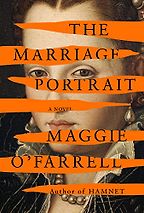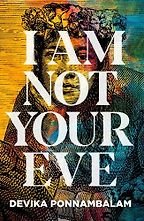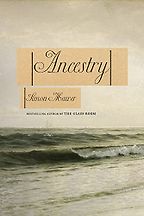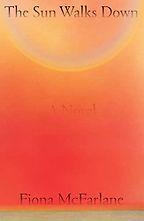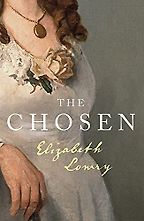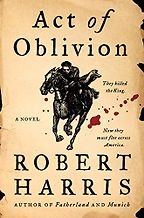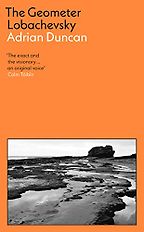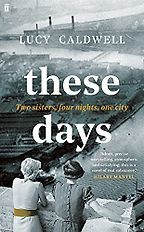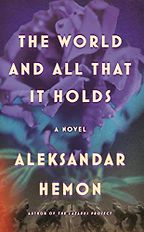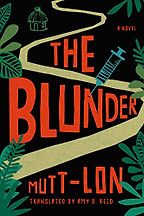New Historical Fiction
Last updated: December 04, 2024
Every year, we interview the judges of the Walter Scott Prize to hear about the best historical novels of the year, but with so much new historical fiction being published every week, we like to keep a look out for other books that look interesting or popular throughout the year. We also keep an eye out for new historical novels published by Five Books interviewees and frequently recommended authors.
Precipice
by Robert Harris
Precipice is the latest historical novel by Robert Harris, one of our favourite writers here at Five Books for his page-turners that rely on historical sources. Precipice is about the outbreak of World War I, told from the point of view of, amongst others, the British prime minister, H.H. Asquith. If this is a piece of history you're at all interested in, it will make your jaw drop, and not in a good way. Winston Churchill also comes off looking very bad indeed.
The Glassmaker
by Tracy Chevalier
The Glassmaker by Tracy Chevalier is set in Venice over the centuries, in particular the island of Murano. This is a really pleasant way to learn a bit about glassmaking and Murano, and about the history of Venice. It's also a love story and a reflection on the passing of time, which may bring a tear to your eye. Chevalier is really good at telling a story and the pages zip by.
“The Instrumentalist is a novel about an all-girls orphanage in Venice, where they’re brought up on music. They learn to play the violin and sing, and Vivaldi teaches them. This is a true story!…The novel focuses on one of the orphans, Anna Maria della Pietà, and her relationship with Vivaldi. She becomes not just a star student and a really great violinist, but she starts composing, and Harriet indicates that she may influence Vivaldi as much as he influences her.” Read more...
Historical Novels Set in Italy
Tracy Chevalier, Historical Novelist
Saltblood
by Francesca de Tores
🏆 Winner of the 2024 Wilbur Smith Adventure Writing Prize for Best Novel
Saltblood by Francesca de Tores is a historical novel that imagines the life of Mary Read, a real-life 18th-century pirate. It's nicely written and very moving, and you're also propelled along by the sheer surprisingness of Read's story: this is a work of fiction but a lot of these things actually happened. At the back, the author lists primary and secondary sources for anyone wanting to find out more.
“it’s about and written from the point of view of Mary Read, and involves her relationship and pirating with Anne Bonny. It tells the story of Mary’s life, which is amazing. It’s almost like she lives several lives, and each of her lives is an adventure…I haven’t read a true account of Mary Read’s life, but there’s quite a lot of historical fact in Saltblood and I suspect it is accurate. One of the things I found incredibly skillful about this novel is that the author makes a real person’s life into a page-turning story. That’s difficult to do. As judges, we all loved Mary Read. One of the judges described her as ‘the badass central character.'” Read more...
“It’s certainly a thriller. It’s tense, tense, tense. But the big thing in this novel is not just the tension, it’s the voices. Joseph O’Connor gives a masterclass in the different voices of the people gathered around the priest Hugh O’Flaherty to help him organise and run the Escape Line—the escape routes out of Italy for POWs and others being pursued by the Nazis. If you feel you know Rome, you’ll find much to enjoy in the twists and turns of the streets, the hidden alleys, the sudden expanses and that ever-present ‘seethe of black water’, the Tiber. It’s full Rome immersion.” Read more...
The Best Historical Fiction of 2024
Katharine Grant, Historical Novelist
“It’s really gorgeous and engrossing, and you can smell and feel the setting, a city on the Iberian peninsula in the dying days of the Roman Empire. Beautiful sentences just come one after another, effortlessly. And it’s also interesting because it flies in the face of a piece of conventional writing advice, which is to make your characters active, or else you’ll bore your readers. This character never really has any agency—he’s a slave. He doesn’t make any decisions for himself. But it’s still such a compelling story and such a compelling character, and I’m sure this book will be considered a classic in a few years from now.” Read more...
Five of the Best Literary Historical Novels
Paul Carlucci, Novelist
“Hungry Ghosts is a tragedy, and we’re swept into it by writing that conjures a whole physical, emotional and natural world of Trinidad; you get a sense of a burgeoning place, almost overwhelmed by vegetation. Hosein write with what one critic has called ‘sensory maximalism.’ The colours are bold. The smells waft from the page. When you close the book, you’re surprised to find yourself still at home.” Read more...
The Best Historical Fiction of 2024
Katharine Grant, Historical Novelist
Burma Sahib
by Paul Theroux
Travel writer Paul Theroux imagines the life of British writer George Orwell, during the period he spent as a colonial policeman in Burma (now Myanmar) in the 1920s. Orwell wrote about this period in his novel, Burmese Days, and some episodes from his essays appear in the book—though Theroux goes well beyond those to create a work of fiction. The book opens on the ship on the way out to Rangoon, with a woman spying on Orwell through a pair of binoculars as the Suez Canal recedes in the background. As a 19-year-old wearing an Eton tie, she thinks Orwell might make a good prospect for her daughter.
Beyond the Door of No Return
by David Diop
Beyond the Door of No Return by David Diop is a historical novel that opens in France, but is set mainly in 18th-century Senegal, at the height of the slave trade. It's the story of a French botanist, Michel Adanson, and what befell him after going to the island of Saint-Louis in Senegal. As he writes to his daughter, "Things did not go the way I planned. I made the voyage to Senegal to discover plants, and instead I encountered people."
Diop won the International Booker Prize in 2021 for his work of historical fiction set in World War I, At Night All Blood Is Black.
“Absolutely and Forever is the coming-of-age story of a girl, Marianne, from a well-to-do family—boarding school, tennis courts, ponies—who, aged 15, falls ‘absolutely and forever’ in love with a boy. It doesn’t work out. The story may not be unusual in itself but in Rose Tremain’s hands it’s so ‘funny, piercing, singular’, as one critic described it, that it turns into a small masterpiece. Marianne may be as naïve and guileless as girls of her age in the 1960s were, but her sense of herself completely bewitches the reader. And Rose Tremain keeps a tight hold of her story. The book is short and may, to some, seem slight, but every word, every detail, is carefully chosen. It’s a book you can read a second and a third time and still find new aspects to admire.” Read more...
The Best Historical Fiction of 2024
Katharine Grant, Historical Novelist
“The novel is set not on the Underground Railway by which Black people fleeing from slavery crossed the border into Canada, but in the free town established at the end of the Railway. We’re in the complicated world of individuals from different communities – the Black community, the Indigenous community, the Métis community – whose histories are rich and whose choices are complex….This book—which is Kai Thomas’s first novel—is marvellously done, technically speaking. It’s stories-within-stories, a bit like Scheherazade.” Read more...
The Best Historical Fiction of 2024
Katharine Grant, Historical Novelist
“James is a reworking of The Adventures of Huckleberry Finn narrated by Jim, the escaped slave with whom Finn travels on a raft. In a starred review, Publishers Weekly noted that in this version, Jim is ‘a Black man who’s mastered the art of minstrelsy to get what he needs from gullible white people.'” Read more...
Cal Flyn, Five Books Editor
“It’s the story of a brave attempt to rationalise sexual behaviour, and thus remove the stigma attached to homosexuality. Tom Crewe has used, quite loosely, the lives of two men, John Addington Symonds and Havelock Ellis who, in the book, become John Addington—a single-minded man who wants to create a world in which everybody is free to live as their nature dictates, but who is also flawed and selfish; and Henry Ellis, a shy, fragile, clever man who wants the same thing. Both these men personify that high Victorian belief that if only one could educate people, people would understand and accept. So, by proving that homosexuality has always been a part of human life and human nature, they hoped it would become ordinary, as indeed has happened now in the UK. But what happens when principle, rational thinking and hope crash into reality? Will they succeed or themselves face ruin? That’s the great tension at the heart of the book. There’s a rare honesty in the writing of this book. It’s written so directly, the sex graphic yet unsensational. Tom Crewe is a true craftsman.” Read more...
The Best Historical Fiction of 2024
Katharine Grant, Historical Novelist
“The Tower is a retelling of the 1567 imprisonment of Mary, Queen of Scots, in Lochleven Castle following the murder of her first husband and an uprising among her courtiers. The Tower focuses on Mary’s relationship with her ladies in waiting as they weather this bleak incarceration and the queen’s forced, humiliating abdication—all the while looking for an escape.” Read more...
Popular Fiction Highlights of Spring 2024
Cal Flyn, Five Books Editor
The Silver Bone
by Andrey Kurkov
Longlisted for the 2024 International Booker Prize
The Silver Bone is by Andrey Kurkov, one of Ukraine's best-known writers. It's a historical novel set in Kyiv in 1919, and (apparently) the first in a series of detective novels. This was a period of fighting between various factions—and is also the setting for The White Guard (1915) by Mikhail Bulgakov. Kurkov apparently took inspiration "from the real-life archives of crime enforcement agencies in Kyiv"–though there's also comedy and magical realism.
The Women
by Kristin Hannah
The Women by Kristin Hannah hit the bestseller lists on publication in February 2024 in the United States. It's set in the 1960s, and tells the story of a 20-year-old American woman who follows her brother to war in Vietnam. It shines a light on a topic not often focused on: the American women who served in Vietnam. In her author's note, Hannah writes that the book "has been a true labour of love, years in the making...It has taken me decades to circle back to the Vietnam War era." At the back of the book, there's a list of memoirs by nurses who went to Vietnam that Hannah read for her research. This novel is just under 500 pages, but as you would expect from an author who has sold some 25 million copies of her books, it's very accessible.
For a novel about the Vietnam War told from another neglected point of view, that of the North Vietnamese, we recommend The Sorrow of War (1991) by Bao Ninh.
“One of the biggest books of the season…is Zadie Smith’s new novel, The Fraud. It’s a work of historical fiction—her first—set in Victorian England, and exploring art-that-imitates-life, abolitionism, and a scandalous case of identity theft that gripped the nation. It was an instant New York Times bestseller and has garnered some brilliant reviews in the three weeks it has been out so far. (The Observer said it was ‘almost flawless… her funniest novel yet.’)” Read more...
Cal Flyn, Five Books Editor
The House of Doors
by Tan Twan Eng
☆ Longlisted for the 2023 Booker Prize
The House of Doors is another beautiful historical novel by Malaysian novelist Tan Twan Eng. Set in Penang, it's told through the eyes of two people: Lesley Hamlyn, a Malaysian-born English woman married to a lawyer and the British novelist W. Somerset Maugham (Willie). It's a wonderful fusion of fact and fiction, featuring also Sun Yat-sen—the Chinese revolutionary who served as the first president of the Republic of China. Sun Wen, as he liked to be called, spent time in Penang in 1910.
“There are a lot of different strands to this novel, one of which is secrets. But it’s also about memory and loss, and the stories we tell to ourselves and to others. Set in 1921 in the Straits Settlements of Penang, we have Somerset Maugham and his lover coming to stay with the Hamlyns: Robert Hamlyn, a lawyer, and his wife Lesley a society hostess. The visit is uneasy. Everybody has secrets, and Somerset Maugham was notoriously good at persuading people to share them, and then, barely disguising the characters, using the stories to his own authorial advantage. With great artistry, Tan Twan Eng shows us how the unravelling of secrets leads to other stories.” Read more...
The Best Historical Fiction of 2024
Katharine Grant, Historical Novelist
The Black Crescent
by Jane Johnson
The Black Crescent by British novelist Jane Johnson is a lovely work of historical fiction that introduces you to the world of 1950s Morocco, at the time of the country's struggle for independence from France. The main character, Hamou Badi, is from a mountain village but ends up becoming a policeman and working in Casablanca. The author, Jane Johnson, has set a number of her novels in Morocco where she met her husband, Abdel Bakrim, and now lives for half the year (see below for the story of how that happened!). As well as being a good story, the book is a nice way of learning about Morocco's recent history alongside her.
“Alice Winn’s In Memoriam—a love story set during the tumult of the First World War—came roaring out of the starting gates and straight into the bestseller lists. In it, two heartsick schoolboys are forced to confront their feelings for one another amid the horror of war. It’s been endorsed by such literary grandees as Maggie O’Farrell and Garth Greenwell; The New York Times has also described it as both ‘devastating’ and ‘tender'” Read more...
Cal Flyn, Five Books Editor
M: Son of the Century
by Antonio Scurati
🏆 Winner of the 2022 European Book Prize
Antonio Scurati's novel about the rise of Fascism in Italy, told from the point of view of Benito Mussolini. There are also excerpts from newspapers and reports. The first in a trilogy, this 700+ page book includes the March on Rome as well as the murder of Giacomo Matteotti, ending in 1925.
Finger Bone
by Hiroki Takahashi & Takami Nieda (translator)
🏆 Winner 2014 Shincho Prize for New Writers
Finger Bone was the debut novel of award-winning Japanese writer Hiroki Takahashi, first published in English in 2023. The title alone conveys a lot of its horror: rather than gravestones, when Japanese soldiers died in World War II, one finger would be chopped off, stripped of its flesh and sent home to the family. The novel is set in Papua Guinea in 1942, and details the experience of a young, wounded soldier in the Imperial Japanese Army. It's a short, very sad book.
The Marriage Portrait: A Novel
by Maggie O'Farrell & narrated by Genevieve Gaunt
☆ Shortlisted for the 2023 Women’s Prize for Fiction
“I liked what Claire Allfree had to say about it in The Times: “So headily perfumed is her prose it works on the reader almost like a drug.” Sound good? Then I suspect this historical romance (of a kind) will work for you.” Cal Flyn in Notable Novels of Fall 2022
“Maggie writes so beautifully, just on a sentence-by-sentence basis. Her metaphors and similes are always fresh, and her characters are so deftly and fully written. I just loved this book.” Read more...
Historical Novels Set in Italy
Tracy Chevalier, Historical Novelist
I Am Not Your Eve
by Devika Ponnambalam
☆ Shortlisted for the 2023 Walter Scott Prize for historical fiction
Devika Ponnambalam's historical novel presents the story of Teha'amana, the child-bride and muse of the French artist Paul Gauguin, and the girl who features in his most famous work, 'Manaò tupapaú' ('Spirit of the Dead Watching'). I Am Not Your Eve is written primarily from Teha'amana's perspective, but includes several other voices, creating the clash of cultures between the French colonists, Christian missionaries and the indigenous peoples of Polynesia. While presenting their 2023 historical fiction shortlist, the Walter Scott Prize judges said it was "a complex novel" that raised "uncomfortable issues of morality." It demands a lot of the reader, they added, but is "deeply rewarding."
Ancestry: A Novel
by Simon Mawer
☆ Shortlisted for the 2023 Walter Scott Prize for historical fiction
Mawer won the 2016 Walter Scott Prize for his novel Tightrope—the story of a female secret agent for the British during World War II. He returns to the shortlist with a new historical novel that delves into the stories from the author's own family tree. As the 2023 Walter Scott Prize judges observed: "he refuses to choose between fiction and fact," melding his archival research with imagined elements that takes us from poverty-stricken London to the Crimean War. It's an "ambitious novel" and a "memorable family odyssey that takes the reader into a fictional realm."
The Sun Walks Down
by Fiona McFarlane
☆ Shortlisted for the 2023 Walter Scott Prize for historical fiction
In The Sun Walks Down, a historical novel set in 1883 Australia, the disappearance of a six-year-old boy during a duststorm electrifies an outback community of farmers, artists, servants, cameleers and Aboriginal peoples, and forces a broader reckoning in this uneasy colonial society. This is a slowburn mystery of literary merit, with a complex, multi-layered plot and intense atmospheric effect. The 2023 Walter Scott Prize judges described it as a "rich and empathetic novel" which offered the reader the keys to understanding Australia, summoning its landscape—"at once beautiful and alien"—and its "burning sun" directly onto the page.
“The thing I love most about this book is just how wonderfully, beautifully, cleverly it’s written. The author shifts between characters in a way that doesn’t feel like she’s omniscient. She dives into the perspective of each character. And it’s so cleverly done. I keep reading it as a writer, wanting to analyse how she is doing it, but then I forget and suddenly I’m with someone else. It feels very natural! It’s a wonderful book. It centres on a missing boy, a missing white boy called Denny. He’s six years old and has sort of created his own mythology, which is perhaps what leads him to get lost in this dust storm.” Read more...
The Best Australian Historical Fiction
Kate Kruimink, Novelist
The Chosen
by Elizabeth Lowry
☆ Shortlisted for the 2023 Walter Scott Prize for historical fiction
In The Chosen, Elizabeth Lowry examines—by way of historical fiction, drawn from fact—the troubled marriage of Thomas Hardy and his wife Emma. After Emma's death in 1912, Hardy read her diaries recording their years together; their contents, the story they told about their dissolving partnership, disturbed him so much that he burned them. "Combining meticulous research with a poet’s imagination, Lowry gives voice to both Hardy and to his downtrodden wife," said the judges of the 2023 Walter Scott Prize. "The result is an extraordinary work, full of tenderness and unexpected humour. It’s a portrait of a marriage gone wrong and an investigation into the grammar of grief. Along the way, we consider the parasitic relationship art can have with life, and the transcendent power of love."
Act of Oblivion
by Robert Harris
☆ Shortlisted for the 2023 Walter Scott Prize for Historical Fiction
New historical novels by British writer Robert Harris are always worth looking out for so don't let the blitz of marketing surrounding his latest, Act of Oblivion, put you off. It's set at an interesting point in English history: the immediate aftermath of the Restoration of the monarchy in 1660. Through the reflections of one of the main characters, we see the events leading up to the execution of Charles I more than a decade previously, in 1649, as well as the battles of the English Civil War and Oliver Cromwell's New Model Army. Puritan America is also an important part of the setting. If you're interested in history and don't know the details of this period, it's an interesting book, not least because you can't help but reflect on what it takes to tip a country into civil war.
The Geometer Lobachevsky
by Adrian Duncan
☆ Shortlisted for the 2023 Walter Scott Prize for historical fiction
The Irish writer, artist and former structural engineer Adrian Duncan draws from his unusual blend of expertise in his novels—which have previously featured a Berlin construction site and a retired bridge engineer. The Geometer Lobachevsky is about a Soviet mathematician who has been working to survey peatbogs for mechanised harvesting in 1950s Ireland. But to describe it in such terms "is akin to relegating Leonardo’s Last Supper to thirteen men having dinner," protest the judges of the 2023 Walter Scott Prize for historical fiction. "Like the bog Lobachevsky is surveying, the unassuming surface conceals ‘a subterranean ocean on a gusty day’." It's a "quiet gem" that brings a great, fitting precision to the inner life and melancholy predicament of our protagonist, as he attempts to evade a summons to return to the USSR.
These Days
by Lucy Caldwell
🏆 Winner of the 2023 Walter Scott Prize for historical fiction
Lucy Caldwell's fifth novel is set during the Belfast Blitz, a series of four devastating major air raids on the Northern Irish city in 1941. It's "an under-told chapter in the fiction of my city," as Caldwell reflected; researching the book felt like "a strange, intense sort of solace" during the early days of the Covid crisis. The novel focuses on two sisters, Audrey and Emma, whose comfortable middle-class existence is shattered during the attacks. While announcing the shortlist for the 2023 Walter Scott Prize for historical fiction, the judges noted that "the juxtaposition of the horrific and mundane and the authenticity of detail makes this novel an exceptional study of the terrors and consequences of war."
The World and All That It Holds
by Aleksandar Hemon
🏆 Winner of the 2023 Grand Prix de Littérature Américaine
The World and All That It Holds is a new historical novel by Bosnia-born novelist Aleksandar Hemon, who we interviewed more than a decade ago on the cheery topic of 'Man's Inhumanity To Man'. This novel is set at the outbreak of World War I and ranges from Sarajevo (where the main protagonist witnesses the killing of Archduke Ferdinand and Sophie, his wife) to Shanghai.
The Blunder
by Mutt-Lon
The Blunder by Mutt-Lon, the pen name of Nsegbe Daniel Alain, is a historical novel set in early 20th century Cameroon, when the country was split between French and English colonial administrations. It's based on the true story of Dr. Eugène Jamot, a French military doctor whose head still graces a monument outside the Ministry of Public Health in Yaoundé, the capital, but whose legacy is decidedly mixed. The book is a revealing, refreshing and entertaining read, written in French and translated into English by Amy Reid.
The Best Historical Fiction of 2024, recommended by Katharine Grant
The judges of the Walter Scott Prize aim to highlight the very best new historical novels, and in 2024 they have settled on a varied shortlist featuring a Trinidadian tragedy, a Vatican-based thriller, and a charming coming-of-age tale from 1960s Middle England. We spoke to Katharine Grant, chair of the judging panel, to find out more.
